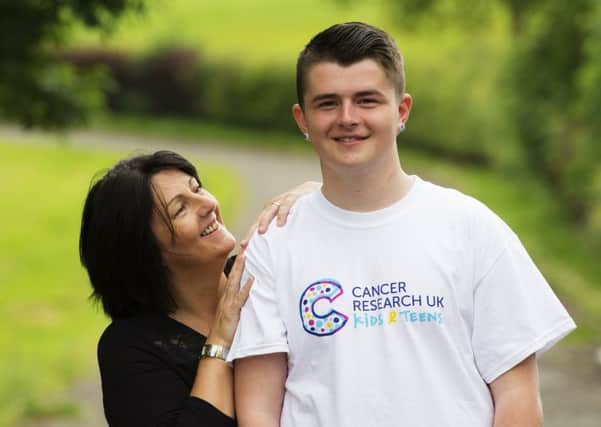Young cancer victims denied revolutionary treatments


Scottish researchers revealed that there were 534 trials for experimental cancer treatments suitable for 16 to 24-year-olds in the UK but only 152 were available north of the border.
Just 19 of the available 39 cancer trials open for children under 16 in Scotland, according to research presented at the National Cancer Research Institute (NCRI) Cancer Conference in Liverpool today.
Advertisement
Hide AdAdvertisement
Hide AdCampaigners have said the trial gap is “deeply concerning” for young Scots, who need treatment to be tailored as the biology of their cancers can be very different to adults.
Study author Dr Angela Edgar, a clinician at Edinburgh’s Sick Kids Hospital and chair of the NCRI Teenage and Young Adults Clinical Studies Group, said: “Our study confirms that children and young adults in Scotland have fewer clinical trials available to them compared to the rest of the UK.
“The reasons are likely to be complex, but we need to close this ‘trial gap’.
“The most disadvantaged are 16 to 24-year-olds.
“There are fewer trials for them to begin with, and unlike younger children, they are often treated at centres where trial recruitment in this age group may be unfamiliar and overlooked.”
Young adults with cancer are offered treatment across multiple hospitals in Scotland, so that they can be treated near to their homes, rather than in the specialist centres offering clinical trials in Aberdeen, Glasgow and Edinburgh.
There needs to be more collaboration between hospitals and greater awareness of the trials available, said Dr Edgar.
She added: “It should be seen as the norm to have every patient put forward on to a pathway for a clinical trial in collaboration with one of these treatment centres.”
The Scottish Government recommends that all children and young adults should be able to go on clinical trials because there are benefits in survival and patient experience.
Advertisement
Hide AdAdvertisement
Hide AdProfessor Matt Seymour, NCRI clinical research director, said: “Compared with most countries, cancer patients in the UK are much more likely to be offered the chance to take part in clinical research as part of their treatment.
“Participating in research is a win-win.
“It brings direct benefits by ensuring you get access to modern treatment and intensive support, but it is also the best way to contribute to improving treatment for patients in the future.
“So it is hugely important to highlight groups where we could do better, and Dr Edgar’s study throws down a challenge to increase the access to research for young people in Scotland.” Young Scots should not face a postcode lottery over whether they get access to experimental treatment, said Professor Pam Kearns, Cancer Research UK’s expert on childhood cancers.
She said: “The shortage of trials available for young people in Scotland is deeply concerning.
“The opportunity for children and teenagers to get on to relevant clinical trials should not be dependent on how old they are or where they live.
“To address this gap, we need to understand the complex reasons behind why it happens.
“Despite improving survival rates, cancer is the main cause of death in children, teenagers and young adults in the UK.”
Health Secretary Shona Robison said last night: “The Scottish Government works hard to make clinical trials available to as many patients as possible who wish to participate, including teenagers and young people with cancer.
Advertisement
Hide AdAdvertisement
Hide Ad“Last year the Scottish Government-funded Scottish Cancer Research Network supported 343 cancer studies across Scotland, recruiting 6,782 cancer patients, including children and young adults.”
Ms Robison added: “We will continue to work with the clinical research community to identify and remove any barriers to the participation of young people with cancer in clinical trials.”
CASE STUDY: Teenager was able to avoid radiotherapy
Taking part in a clinical trial meant a great deal to cancer survivor Taylor Kershaw.
The Glasgow teenager was diagnosed with Hodgkin lymphoma in 2012, and was given the opportunity to participate in a Cancer Resarch UK (CRUK) trial looking at alternative treatments to help lower the risk of long term side effects.
It meant that Taylor, 16, went in to remission without having to go through radiotherapy.
He is now clear of cancer and fronts the CRUK Kids and Teens campaign.
His mother Michelle, 47, said: “Taking part in a trial meant a huge amount to us as a family. For Taylor it meant that he didn’t have to receive radiotherapy, something he felt very fearful of.
“For all of us, we were reassured that the treatment he was going to get was going to be kinder than what had been traditionally on offer. And because the trial had been running for a long time, we also had confidence in its success.”